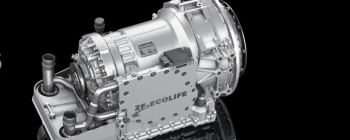
Latest developments further improve fuel-efficiency in city buses
Continuing the company’s fuel optimisation strategy, ZF have re-engineered the EcoLife 6-speed automatic transmission to include start/stop functionality for city bus applications. The addition of the start/stop function can contribute fuel savings of up to ten per cent in conventional diesel city buses; automatically shutting off the engine when the bus comes to a standstill. With this the engine and transmission remain ready for an immediate start as the driver’s foot moves from the brake pedal to the accelerator.
A potential obstacle when applying start/stop to an automatic transmission is ensuring that traction is instantly available on engine restart. With an innovative approach to the challenge, Nigel Marson, OE Account Manager for Commercial Vehicles at ZF Services UK explains: "The start/stop function requires the gear shift elements to be filled with oil as soon as the engine restarts, so the bus can pull away immediately. One method of achieving this is to use a supplemental electric pump to provide transmission oil pressure while the engine is in the start-up phase. However, we adapted the existing EcoLife hydraulic system to exploit the pressure stored in the primary retarder oil accumulator. This way, the system does not require an additional electric motor to be installed in the driveline, so installation space and cost are minimised."
The system allows for an unlimited number of stops and restarts. Even after an extended engine standstill due to heavy traffic. During the redesign, engineers also strengthened the transmission’s torque converter and lock-up clutch, improving robustness to cope with the additional demands of more frequent engine start cycles.
Ongoing continuous development
EcoLife is already recognised within the passenger transport industry as a fuel-efficient bus transmission. It continues to be the subject of further development to minimise fuel usage. Particularly through revisions to its transmission control software. ‘TopoDyn Life’ is a topographic dynamic gear shift strategy that eliminates the compromise of choosing a single shift programme (e.g. Eco, Normal, Power) that may only suit terrain and driving conditions on part of a bus route. Instead, TopoDyn Life continuously monitors the topography and all driving resistances and uses this data to calculate the ideal gear shifting points for any driving condition. Furthermore, instead of switching between drive programmes with significantly different shift characteristics, TopoDyn Life makes a progressive transition through the shift spectrum to optimise fuel efficiency.
Following TopoDyn Life, the most recent generation of EcoLife transmission control software has been hailed as a significant contributor to lower operating costs. For example, one operator of a large fleet of EcoLife-equipped vehicles compared the results of the improved transmission software with those of the previous software evolution, reporting fuel savings in the range 4.0 to 5.5 per cent.
For more information on click here.


 Click here to open the navigation menu
Click here to open the navigation menu